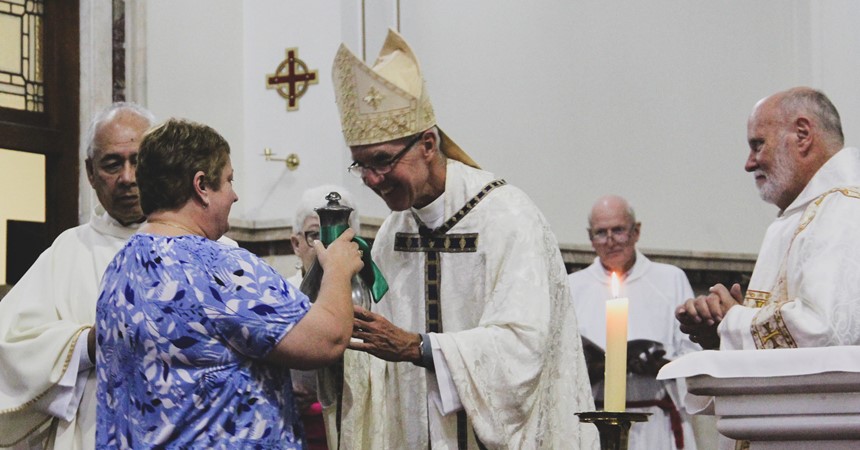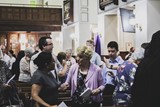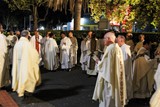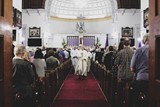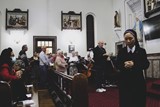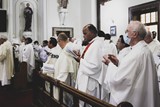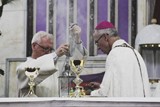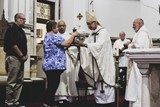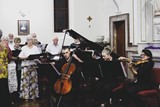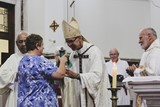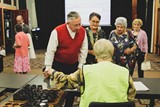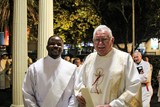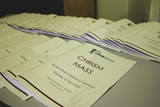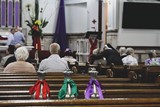Holy Week prepares us for the celebration of Easter. Our diocesan Chrism Mass is a big part of that week and this year, with relaxed pandemic restrictions, the Chrism Mass was back. There were more than 300 people who gathered and once again lifted the roof from the Cathedral with the volume of our prayer and singing. People were so happy to catch up again. How good it was to have a face-to-face conversation with people from Taree and Branxton and Singleton and Merriwa and Scone. The pictures in the accompanying gallery convey the experience far better than words.
The Chrism Mass is always a great preparation for the Easter Triduum which is, of course, the main event. Over the three-day liturgy, we don’t just recall something that happened 2,000 years ago. We re-member and celebrate Christ’s paschal journey from life, through death to resurrection. In the liturgy, Christ’s Paschal Mystery is a present reality in which we participate. It is as meaningful, shocking, and life-changing for us today as it was for the first Christians. As Eamonn Bredin puts it so powerfully:
The resurrection event is neither reported nor described in the Scriptures. It is first and foremost a matter of faith; not an occurrence that can be observed, a reality more real than the observable. For the early Christian community the resurrection was not a dogma to be believed but a daring, decisive, power-filled call to live as Jesus lived; a distinctive way, the way of kingdom obedience.
Thus in the mystery of the resurrection: we are not faced with something over and done with, something imprisoned in the past, but an intensely present reality… 1
I don’t know about you but my experience of the present reality of the paschal mystery is not lineal but rather a constant cycle of dying – rising experiences through every day. Interestingly, in the Triduum, I often find myself stuck in the Garden of Gethsemane, not ready to move on to Good Friday. Or stuck at the foot of the cross on Good Friday, not feeling at all ready to celebrate the resurrection at the Easter Vigil or on Easter Sunday morning. This is the very wisdom of liturgy. It rehearses me in the steps from death to new life so that I know when I am sitting at the foot of the cross in my everyday life, that I can have ‘sure and certain hope’ that this is not the end.
When I am in agony and feel totally alone …
When I am betrayed …
When I feel spat upon and humiliated …
When I am the victim of fabricated stories and falsehood …
When I am in denial …
When I am scourged by the insults of others …
when I feel like a laughing stock …
When I fall down, once, twice, three times …
When I feel I am carrying the weight of family or the world on my shoulders …
When I am stripped of everything I hold dear …
When I thirst …
When I am hung out to dry …
When I feel dead and buried …
In all these moments that continue through Easter and all of life, I recognise that I am in the reality of the paschal mystery, and I know deep within that this is not the end and that new life will come. This is our faith, the source of our hope. This is what the liturgy teaches me. This is why we never celebrate Good Friday apart from the Triduum. ‘The people that lived in darkness have seen a great light!’ [Mt 4:16]
As Ralph Kuehner and Joseph Juknialis have pointed out
resurrection happens whenever love transforms life; when someone offers forgiveness despite a burning desire for vengeance; when a nation begins to value and protect the rights of all, not just a few; when the poor, hungry, homeless and disenfranchised are attended as brothers and sisters; when immigrants and refugees are not left to drown or incarcerated but are welcomed as the children of God.2
How do we keep up the pace, not only for the fifty days of Easter but for the marathon that is the ‘distinctive way of kingdom obedience?’ Well, the Church’s equivalent of a gym or training program is Sunday liturgy.
Those parishes who host the Rite of Christian Initiation of Adults (RCIA) know the Easter Season is the period of Post Baptismal Mystagogy when the parish community accompanies those initiated at Easter as they reflect on their experience of initiation to draw out its meaning for the ‘daring, decisive, power-filled call to live as Jesus lived.’ Mystagogical Reflection is the way we do this. It is a time of growth for the whole community.
Mystagogical Reflection is a wonderful way of prayer and faith sharing that we have been encouraging for some time. It is for everyone, whether or not your parish hosts RCIA and irrespective of your association with the worshiping community. There are many resources available in our diocesan website, particularly Mystagogy Monday which my friend and colleague Rose is organising.
We all know the truth of Eamon Bredin’s statement, ‘in the mystery of the resurrection we are not faced with something over and done with, something imprisoned in the past, but an intensely present reality’. In this reality may we experience the love and forgiveness, the respect and valuing that holds us in sure and certain hope and raises us up to new life.
Wishing you an abundance of easter blessings as we continue on the way of kingdom obedience.
Acknowledgements
[1] Source unknown.
[2] Patricia Sanchez An Evolving Church http://ncronline.org/blogs/spiritual-reflections/evolving-church-0
Photos: © 2021 Diocese of Maitland-Newcastle. All rights reserved.
